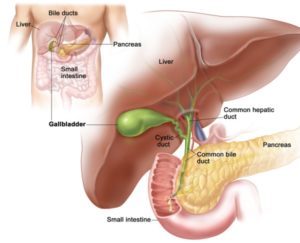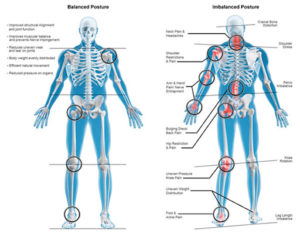Acid reflux is the chronic symptom of mucosal damage caused by stomach acid coming up from the stomach into the esophagus. Commonly referred to as GERD (Gastroesophageal Reflux disease), it is normally caused by the failure of the lower esophageal sphincter (LES) – a structure created by the Angle of His (angle at which the esophagus enters the stomach). The sphincter prevents gastric juices from flowing up into the esophagus where they might cause irritation and inflammation of the hypersensitive esophageal membrane. This irritation results in the common symptoms seen in GERD: heartburn, increased salivation, chest pains, nausea and coughing.
Acid reflux can be a disease on its own (GERD), but can also be a symptom or result of an underlying morbidity (Gastritis, Gall bladder stones, Zollinger-Ellison Syndrome etc.). Thorough testing and proper diagnosis is required to pinpoint the origin of the acid reflux.
How does Chinese Medicine understand Acid Reflux?
In Chinese Medicine, Acid reflux (吐酸) is a sickness of the stomach (胃), but also involves the spleen (脾) and the liver (肝). This is due to their relationship in the Chinese Medicine 5-Element Theory (五行). The main function of the stomach is to direct the downward movement of Qi, especially in the digestive system. When the stomach is compromised (either by external factors (外邪) or internal weakness (内伤)), this function is disrupted. The Qi then rushes upwards and takes the gastric juices with it, resulting in acid reflux.
The spleen and the stomach are close partners in the digestive system. In the flow of Qi, the spleen governs the digestion of food and the upward-movement of the clean, nutritious Qi into the organs, while the stomach governs the downward movement of Qi to excrete waste. This bi-directional flow of Qi is required for a healthy digestive system. When one of the two organs is compromised, it adversely affects the function of the other organ as well as disrupts the flow of Qi in the digestive system. As such, a malfunctioning spleen is often paired with a weak stomach.
《寿世保元 吐酸》曰: “夫酸者肝木之味也, 有火盛制金。。。 肝木自甚, 故为酸也。”
The liver is closely-connected to the stomach and spleen. Other than being anatomically close to each other, in the 5-Elements theory, the spleen and stomach (earth) nourishes the liver (wood). While the stomach regulates the downward movement of Qi, the liver is responsible for the overall flow of vital energy in the body. Upon this theory, we can thus separate the cause of gastric reflux into two different diagnostic patterns:
[1] Liver Fire
The liver is susceptible to malfunction especially under stress and emotional duress. When the functionality of the liver is compromised, the flow of Qi is disrupted, causing blockages and stagnation, particularly in its closely-related partner – the stomach. The downward regulation of Qi is disrupted and it rushes upwards, causing regurgitation and acid reflux. Often the stagnation of Qi results in the formation of heat or ‘fire’. This patient may also therefore present with signs of excess internal heat, including fevers, ulcers, bad breath or even emotional frustration .
[2] Weak Speen
Some people are born with a weak constitution or have a weak digestion due to bad eating habits. Looking at the Five-Element Theory, when the spleen is weak, the liver is comparatively stronger. This loss of balance causes the liver to suppress the function of the stomach and, thus, the downward movement of Qi. Common signs and symptoms of weak ‘spleen’ function may include, bloating after meals, poor food digestion, tiredness and lethargy.
How do We Treat GERD?
Western Medicine
Besides diet regulation and lifestyle changes, medicines prescribed include Proton-Pump Inhibitors (Omeprazole, Rabeprazole), H2 Receptor Inhibitors (Ranitidine). They limit the production of gastric acid. Other medicines include Antacids with Alginic acid that stabilize and neutralize gastric acid.
Chinese Medicine
Using Chinese Medicine, GERD is treated differently depending on the particular syndrome presented by the patient. Listed below are the two common syndromes, their treatment strategies and the herbs used to alleviate the patients symptoms.
| Syndrome | Symptoms | Treatment | Function |
| Liver Fire | Acid reflux, burning sensation in the throat, abdominal bloated-ness. Often caused and exacerbated by stress, excessive sighing and/or burping, swelling sensation in the ribs, easily angered or frustrated, have bitterness in the mouth, unusually thirsty. | Coptidis Rhizoma (黄连) Evodiae Fructus (吴茱萸) | Clear liver fire and direct downward movement of Qi in the stomach.清泻肝火,和胃降逆 |
| Spleen Weakness | Acid reflux, burning sensation in the throat, abdominal bloated-ness. Caused by a certain body type or bad eating habits. Burping, often regurgitating digested food, excessive salivation, preference for hot foods, exacerbated by cold foods, cold hands, diarrhea, lethargy. | Codonopsis radix (党参) Atractylodis M. Rhizoma (白术) Amomi Fructus(砂仁) Poria (茯苓)Aucklandiae Radix (木香) Pinelliae Rhizoma (半夏)Citri R. Pericarpium (陈皮) | Strengthen the spleen, clear Qi stagnation and remove phlegm健脾行气,化痰降逆 |
*Please take note that in the event of GERD, please seek the expert advice of a doctor or Chinese physician. Do not self-medicate.
What can You Do to Aid your Recovery?
Diet Management and Eating Habits
Avoid foods that can incur gastric reflux or harm the digestive system such as sour foods (oranges, lemons, limes), chocolate, spicy food, overly-oily food (fried foods or fatty foods), mint, garlic, onion and caffeine (coffee, green tea).
Be careful to avoid having big meals and chew slowly instead of swallowing your food. This allows your food to be broken down into easier-to-manage sizes to aid digestion; It also prevents you from overeating since ghrelin (the hormone that signals satiety) is only released twenty minutes after the start of the meal. A full belly can put pressure onto the LES, impairing its ability to hold down gastric acid and chyle (digesting food).
Lifestyle Changes
Lifestyle habits such as smoking and drinking alcohol can adversely affect your digestive system. Smoking decreases the functionality of the LES. Alcohol also causes the LES to relax as well as increase acid production in the stomach. It seems that alcohol can also impair the ability of the esophagus to clear acid when lying down. A study published in the Journal of the American Medical Association showed that lying down after drinking liquor increased GERD symptoms in healthy individuals even with as little as 4 ounces.
Another important aspect related to GERD is that of breathing habits and diaphragm function. Research has shown that the lower part of the diaphragm helps to stabilize the LES and therefore help prevent gastric reflux. Scientific studies have shown a correlation between patients suffering from GERD, reduced diaphragm efficiency and a tendency towards an upper-chest-pattern of breathing. In these patients the diaphragm usually sits higher in the chest, impairing the proper closure of the LES.
Additionally there is a correlation between poor diaphragm function, and a tendency to suffer from increased shortness of breath, fatigue, neck and back tension, increased stress levels and even headaches. Therefore in teaching the patient how to engage in good abdominal breathing, not only can they better manage their GERD symptoms, they can also have an increased positive effect on their overall well-being.
Most importantly, as with the treatment of any other complex medical condition, engage an expert to help you and keep regular checkups in order to maintain the strength of your digestive system and prevent progression of the disease.




